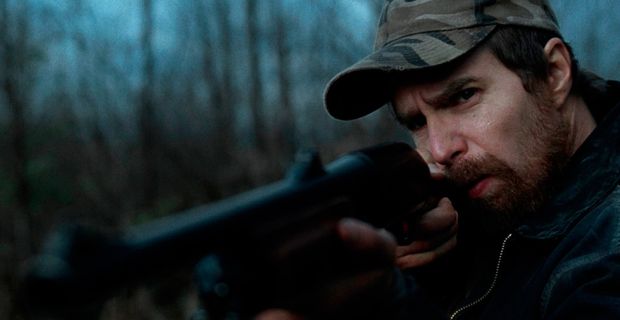
Film: A Single Shot
Directed by: David M. Rosenthal
Written by: Matthew F. Jones
Starring: Sam Rockwell, Jeffrey Wright, Kelly Reilly
A Single Shot is the sort of country-fried noir we don’t often see in America anymore. For whatever reason, it’s usually best to head across the Atlantic if you’re a fan of the genre — Denmark’s Terribly Happy and Austria’s Revanche come to mind as some of the best I’ve seen in recent years. A Single Shot, while not a complete misfire, will unfortunately not be joining those ranks.
Sam Rockwell stars as John Moon. He lives in a trailer, can’t hold a steady job, and perpetually has a mouth full of chaw, which makes his southern drawl even more difficult to understand. Clearly, things couldn’t be going much worse for him. That is, until he accidentally shoots the only person within miles of him while chasing a deer through the woods. But while attempting to hide the carcass of the beautiful woman he just killed, he also seemingly finds the solution to all of his other problems as he stumbles onto a box full of cash.
For all the time director David M. Rosenthal (Janie Jones) spends establishing the foggy, Appalachian atmosphere in the film’s opening scene, much of the movie is spent indoors as Moon becomes entwined in a growing list of shady characters.
Moon first meets up with a cheapie lawyer by the name of Daggard Pitt, where we learn Moon was recently left by his wife and infant son and has had several poaching-related run-ins with the law. It’s likely no coincidence Daggard rhymes with haggard, as William H. Macy hams it up as the gimpy attorney with a bad toupee and cheesy checkered suit. Moon leaves the meeting by dropping a fistful of $100s on Pitt’s desk, ordering him to prolong the divorce proceedings for as long as possible. He wants time to win his wife back, and that box full of cash surely can’t hurt his chances.
The film starts out absorbingly enough as someone (or is it group of someones?) begins terrorizing Moon’s home. Who knows about the cash? How much do they know? Where did this cash come from? And my biggest concern: what in the hell was this random girl doing alone in the woods to begin with? Rosenthal’s camera is effective in capturing Moon’s growing state of paranoia through over-the-shoulder angles and intimate looks at Rockwell’s deep, wary eye sockets. So why must they hammer us over the head with such an intrusive score that screeches and squeals as if the audience doesn’t already know how they’re supposed to feel?
As great as Rockwell is as the quiet, subdued lead, quite the change from the fast-talking wild card we’re used to seeing from him in recent films like Seven Psychopaths and The Way Way Back, the film’s impressive list of supporting players (Macy, Jeffrey Wright, Ted Levine, Jason Isaacs) are equally over-the-top.
Writer, Matthew F. Jones, struggles to string together a cohesive narrative while adapting his own novel and treats these great character actors as sideshow attractions that often come and go without any real consequence. Perhaps Jones is just too proud of his dialogue as what may very well have been compelling in text becomes tedious on screen. Several scenes, particularly those featuring the moonshine-swilling, nearly incomprehensible Wright, drag on far too long without forwarding the plot in any way.
But Jones’s most curious choice comes later in the film when he inserts Ophelia Lovibond as the charming college-aged daughter of Levine’s good-hearted farmer, who recently offered Moon a job. She quickly begins acting on a seemingly long-standing crush she’s had on Moon, but it seems like she’s only there because the writer thought we needed some sort of “woman in distress” angle to make the climax work.
The film presents itself as a morality play, but the it’s missing that internal conflict over what to do with the box of money (much less the dead body) that is so present in better films like A Simple Plan and No Country for Old Men. A Single Shot is just a simple case of the hunter (literally, in this case) becoming the hunted. And with 90 minutes and a fewer extraneous characters, we might be looking at a taught little thriller. But at two hours, we’re looking at a bloated, meandering tragedy that isn’t nearly as profound as it thinks it is.
Grade: C
Review written by: Kevin Blumeyer — Follow him on Twitter
- UTG PREMIERE: Hymn – ‘Mouth’ EP - June 10, 2016
- SakkieFTW snaps you out of it with new EP, ‘Experiment 1.3.2’ - June 6, 2016
- The Lost Poets’ ‘Insubordia pt II’ is dark and gritty - June 3, 2016
